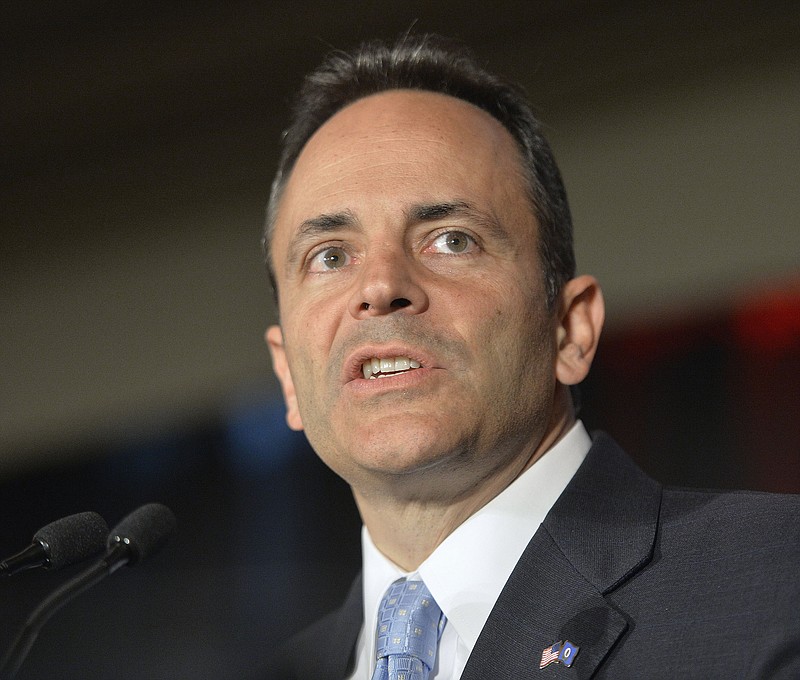WASHINGTON (AP) - State and local elections across the country this week produced warning signs for both Democrats and Republicans as they press toward the 2016 presidential contest, now just a year away.
Democrats lost more ground in legislatures and governor's mansions, raising questions about the party's strength when President Barack Obama's name isn't at the top of the ballot. While Democrats still have important demographic advantages in the states that often determine presidential elections, the party is struggling in power centers outside Washington that influence policy and steer congressional redistricting.
The GOP is casting its victory in the Kentucky gubernatorial race as a blueprint for how Republicans can run successfully against Obama's signature health care law.
But the elections weren't all good news for the Republicans. For party leaders anxious about Donald Trump and Ben Carson's lead in the GOP presidential primary, the win in Kentucky for Matt Bevin - a wealthy businessman who has never held political office - could be a sign that many voters are serious about electing outsider candidates.
Party leaders are skeptical that outsiders' rebellious appeal will be sufficiently deep and lasting to send such a candidate to the White House.
"We're at this interesting moment where clearly there's a lot of frustration in the electorate, which means voters are going to be more volatile," said David Winston, a Republican pollster.
To be sure, off-year elections are imperfect predictors of presidential contests. Turnout is far lower and the voters that do show up tend to be older and less diverse, favoring Republicans.
Still, Tuesday's contests across the country are being scoured for signs of the electorate's mood less than three months before the lead-off Iowa caucuses.
For Democrats, results in Kentucky, Virginia and elsewhere were part of a troubling pattern. Since Obama was elected in 2008, the party has lost 13 governorships and more than 900 state legislative seats, ceding control of 30 legislative chambers. On Capitol Hill, Democrats have given up control of both the U.S. House and Senate.
The fresh losses raise serious questions for Democrats about how the party will fare next year when Obama isn't on the ticket. It's also raising questions about where Democrats will draw their next generation of leaders.
Hillary Rodham Clinton, the Democratic front-runner, is making specific campaign appeals to the Hispanics, blacks and young voters who helped propel Obama to victory. And she's promising the party she'll work to help candidates down the ballot win their races, too.
The Democratic defeats have implications for policies as well as politics, including on union laws and implementation of Obama's health care law. While most Democratic governors have expanded their states' Medicaid coverage under the federal Affordable Care Act, several Republicans have resisted, including in Florida and Texas. Democratic Virginia Gov. Terry McAuliffe tried to expand Medicaid but was blocked by Republicans.
Democrats' efforts to fully implement "Obamacare" got even harder Tuesday. McAuliffe failed in his campaign to put Virginia's legislature back in Democratic hands. And in Kentucky, Bevin won in part on a pledge to repeal the state's Medicaid expansion, propelling a Republican into the state's governor's mansion for just the second time in four decades.
Bevin also cast himself as a political outsider, one who was self-funded and shunned by Kentucky's political establishment after he challenged Senate Majority Leader Mitch McConnell in the 2014 GOP Senate primary. It's an approach that fits with the outsider appeal of Trump and Carson, who are roiling the GOP presidential primary and worrying establishment Republicans who fear neither of them could defeat Clinton in a general election.
Asked Wednesday whether Bevin's win bodes well for his own political future, Trump sounded confident. He said, "There is something happening, folks, I will tell you. There is something happening."
In an interview with The Associated Press, Kentucky Sen. Rand Paul, who is struggling in the GOP presidential polls, aligned himself with Bevin's success as a political outsider.
"That's the same thing I ran on when I ran in 2010," Paul said of his Senate victory five years ago.
Bevin wasn't the only outsider who won this week. In Mississippi, Republican poultry and cattle farmer Vince Mangold made his political debut by ousting Democratic House Minority Leader Bobby Moak, who had been in office for 30 years.
Republicans targeted Moak with mailers displaying his photo next to Obama's under the headline, "Bobby Moak and Barack Obama ... A Liberal Love Affair." Mangold said he campaigned on lower taxes and a good education system, but he attributed his victory not to any particular policy stances but to his outsider status.
"As I traveled around the district, the overwhelming reply was they were ready for a change," Mangold said Wednesday.
___
Lieb reported from Jefferson City, Missouri. AP writers Adam Beam in Frankfort, Kentucky, and Holly Ramer in Concord, New Hampshire, contributed to this report.
___
Follow Julie Pace at http://twitter.com/jpaceDC and David Lieb at http://twitterc.com/DavidALieb
Do not enter text beyond this line.
.
